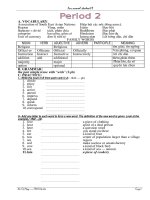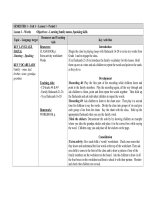Chapter 2. Unit 1 .Technique 1 Guessing Unfamiliar Words.pptx
Bạn đang xem bản rút gọn của tài liệu. Xem và tải ngay bản đầy đủ của tài liệu tại đây (177.37 KB, 9 trang )
Chapter 2: Translation Techniques
UNIT 1: TECHNIQUE 1
GUESSING MEANING OF NEW / UNFAMILIAR WORDS
Objectives:
1. Identify new/unfamiliar word in the sentence.
2. Understand meaning of new/unfamiliar word.
3. Guessing meaning of new/unfamiliar word in context.
4. Apply technique of guessing meaning of new/unfamiliar word in EV and V-E translation
Chapter 1. Unit 1: Technique 1. Guessing meaning of new/ unfamiliar words
DO YOU KNOW?
Success in translating a document requires a translator to use various problemsolving skills. One of these skills is that it is almost impossible for a translator to know the
exact meaning of every word he/she reads, especially when translating from another
language to his/her native language. However, by developing guessing ability, he/she will
often be able to understand enough to arrive at the total meaning of a sentence, a paragraph
or a document as a whole. In using the context to decide the meaning of a word a translator
has to use:
background knowledge
knowledge of the subject matter he/she is translating
knowledge of grammar and sentence structure
ability to understand the author’s ideas
USEFUL HINT
•
Although there is no formula that you can memorize to improve your ability to guess the
meaning of unfamiliar words, you should keep the following points in mind.
HINT:
1. Use the meaning of (i)the other words in the sentence (or
paragraph) and (ii) the meaning of the sentence as a whole to
reduce the number of possible meanings
2. Use grammar and punctuation clues that point
relationships among the various parts of the sentence
to
the
3. Be happy with a general idea about the unfamiliar word; exact
definition or synonym is not always necessary
4. Learn to recognize the situations in which it is not necessary to
know the meaning of the word.
TASK 1
Each of the following sentence contains the word ‘wungle’, which is a nonsense word in English. In
each sentence it is used in a different way, and clearly a different kind of word. Look carefully at each one
to see the different functions it performs. Write your guess in the spaces provided.
1. I stopped a wungle in the street and asked him the way to the post office.
.....................
2. We paid to go into the zoo and saw the wungles. .....................
3. The earth in my garden is so rich that my wungles are growing nicely......................
4. The experience gave me a strong feeling of wungle.
.....................
5. They saw not just one but the whole wungle of them.
.....................
6. He was unfortunately rather wungled last night. .....................
7. I am pleased that it was all so wungleful.
.....................
8. We were disappointed at how wungly they treated us.
9. Congratulation on doing it so wunglefully.
.....................
.....................
10. She spends every Saturday night at home wungling.
.....................
TASK 2
• Without using dictionary, do you know the meaning and the types of the following words? If not, try to
guess and write your guess (even in Vietnamese) in the spaces provided.
1. pounce
………
5. pelt
………
2. adapt
………
6. gregarious
………
3. inveigh
………
7. ravenous
………
………
8. salvage
4. slither
……….
• Now you will see the words again. Concentrate on developing your ability to guess the meaning of
unfamiliar words using context clues. Read each sentence carefully, and write a definition, synonym, or
description of the italicized word on the line provided.
For example:
Some people have no difficulty making the necessary changes in their way
•
adjust
of life when they move to a foreign country; others are not able to adapt as easily to a
new environment
TASK 2: PRACTICE
Now do the same.
1. ………. We watched as the cat came quietly through the grass toward the bird. When it was just a few feet from the
victim, it gathered its legs under itself, and pounced.
2. ……….When he learned that the club was planning to admit women, the colonel began to inveigh against all forms of
liberalism; his shouting attack began with universal voting and ended with a protest against divorce.
3. ………. The snake slithered through the grass.
4. ………. The man thought that the children were defenseless, so he walked boldly up to the oldest and demanded money.
Imagine his surprise when they began to pelt him with rocks.
5. ………. Unlike his gregarious sister, Jane is a shy, unsociable person who does not like to go to party or to make new
friends.
6. ………. After a day of hunting, Harold is ravenous. Yesterday, for example, he ate 2 bowls of soup, salad, a large
chicken, and a piece of chocolate cake before he was finally satisfied.
7. ………. After the accident, the ship went down so fast that we weren’t able to salvage any of our personal belongings.
Now translate the sentences from 1-7 into Vietnamese and check your translation with that of your friends.
TASK 3:
VIETNAM NEW TECHNOLOGY IN TREE PLANTING
•Read the passage below and translate it into Vietnamese. Write your translation in the space
provided. You are not allowed to use dictionary.
The gradual deforestation of the upstream
riverine areas of Northwest and northern
Centre of Vietnam has led to a number of
damaging
environmental
effects.
The
immediate effect of the removal of root
.....................................................................
.....................................................................
.....................................................................
.....................................................................
.....................................................................
.....................................................................
systems and overhead shelter is to expose
.....................................................................
the earth to wind attrition, resulting in soil
.....................................................................
erosion.
.....................................................................
Subsequently,
when
trees
no
longer remove ground water, a second
consequence of deforestation is a rise in
water table, resulting in a great incident of
.....................................................................
.....................................................................
.....................................................................
.....................................................................
flooding and salinity. Both these problems
.....................................................................
pose a serious threat to agriculture, the
.....................................................................
most important sector of the country’s
.....................................................................
.....................................................................
•This is one part of a longer translation exercise. After the exercise, some of the students were
asked if they had any problems while translating it. Below are some of their answers.
Student 1
I started translating right away. However, some difficult structures slow me down a
lot. I feel comfortable with Vietnamese sentences, but the English words did confuse me at first...
Student 2
Many new words. They prevented me from translating. I understand the idea of the
whole passage, but I have left some sentences just translated. I didn’t do the translation well enough.
Maybe I will do it again...
Student 3
I have never read anything about forestry, so I really got shocked when I read the
passage. I usually translate something more common, not anything specific like that...
Student 4
I feel it difficult to understand the passage. My translation doesn’t sound
Vietnamese at all. Why did people write English that way?
Student 5
I understand the passage, but it is not easy to give Vietnamese equivalents to some
of the phrases, isn’t it.
WHO ARE YOU?
Thank you!
TRƯỜNG ĐẠI HỌC VINH
VINH UNIVERSITY









